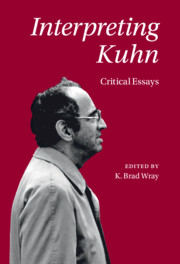Book contents
- Interpreting Kuhn
- Interpreting Kuhn
- Copyright page
- Dedication
- Contents
- Figures
- Contributors
- Acknowledgments
- Abbreviations
- Introduction
- Part I Foundational Issues
- Part II Three Core Concepts
- Part III Kuhnian Themes
- Chapter 8 The Copernican Revolution since Kuhn
- Chapter 9 Kuhn, the Duck, and the Rabbit – Perception, Theory-Ladenness, and Creativity in Science
- Chapter 10 Kuhn on Scientific Discovery as Endogenous
- Chapter 11 Truth, Incoherence, and the Evolution of Science
- Chapter 12 Reassessing Kuhn’s Theoretical Monism
- Bibliography
- Index
Chapter 11 - Truth, Incoherence, and the Evolution of Science
from Part III - Kuhnian Themes
Published online by Cambridge University Press: 25 June 2021
- Interpreting Kuhn
- Interpreting Kuhn
- Copyright page
- Dedication
- Contents
- Figures
- Contributors
- Acknowledgments
- Abbreviations
- Introduction
- Part I Foundational Issues
- Part II Three Core Concepts
- Part III Kuhnian Themes
- Chapter 8 The Copernican Revolution since Kuhn
- Chapter 9 Kuhn, the Duck, and the Rabbit – Perception, Theory-Ladenness, and Creativity in Science
- Chapter 10 Kuhn on Scientific Discovery as Endogenous
- Chapter 11 Truth, Incoherence, and the Evolution of Science
- Chapter 12 Reassessing Kuhn’s Theoretical Monism
- Bibliography
- Index
Summary
I spell out Kuhn’s rationale for pursuing the evolutionary approach. He first concluded that the historical record does not support the assumption that science develops teleologically towards the truth, which then led him to outline an evolutionary view of scientific development. Kuhn argues that the future of the sciences is open-ended and that the sciences are bound to diversify, not unify. Because the historical process of the sciences leads to an ever more fragmented outcome, there is no coherent worldview at the end of this process. Kuhn thought that not only sciences fail to arrive at the final truth about the world, but that truth as correspondence to the mind-independent world must be rejected. Because sciences’ niches, in which sciences are practiced, change, there simply is no fixed and permanent mind-independent world to which statements and theories could correspond. Nevertheless, Kuhn was interested in the function of ‘truth,’ that is, the possibility to judge whether beliefs and theories should be accepted or rejected. I argue that a specific Sellarsian pragmatist notion of truth, which understands truth as semantic assertibility, serves Kuhn’s interests well.
Keywords
- Type
- Chapter
- Information
- Interpreting KuhnCritical Essays, pp. 202 - 221Publisher: Cambridge University PressPrint publication year: 2021
- 6
- Cited by

